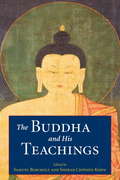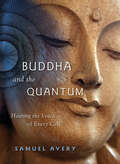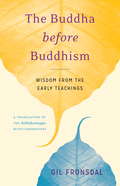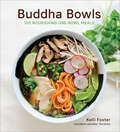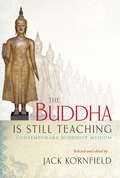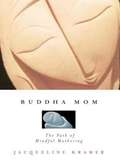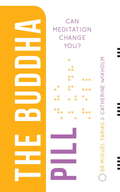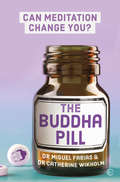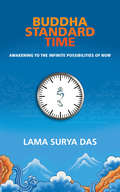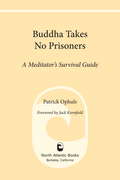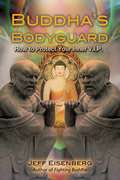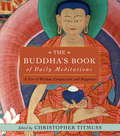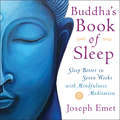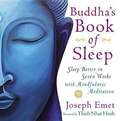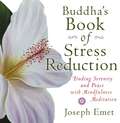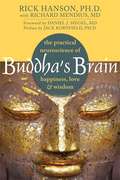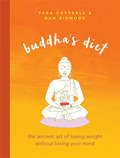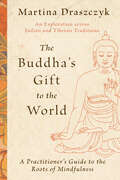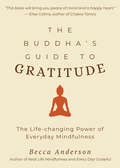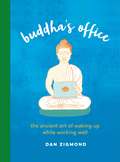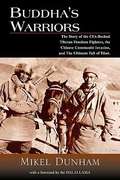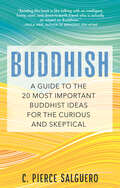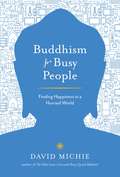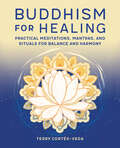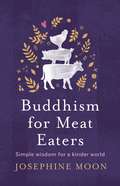- Table View
- List View
The Buddha and His Teachings
by Samuel Bercholz Sherab Chodzin KohnOriginally published as Entering the Stream, this book offers a simple and inspiring answer to the question "What is the Buddha's teaching?" primarily in the words of the Buddha and other masters. This anthology draws on traditional Indian, Chinese, Japanese, and Tibetan sources as well as teachings by contemporary Buddhist masters. Among the contributors, both classical and modern, are: Ajahn Chah, Pema Chödrön, The Second Dalai Lama, Dogen, S.N. Goenka, Dainin Katagiri, Hakuyu Taizan Maezumi, Milerepa, Padmasambhava, Reginald Ray, Shunryu Suzuki, Nyanaponika Thera, Thich Nhat Hanh, Chögyam Trungpa, and Burton Watson.
Buddha and the Quantum: Hearing the Voice of Every Cell
by Samuel AveryBuddha and the Quantum is about the connection between meditation and physics. Many books show parallels between consciousness and physics; a few of these attempt to explain consciousness in terms of the physics of everyday experience.
The Buddha before Buddhism: Wisdom from the Early Teachings
by Gil FronsdalIn the tradition of the best-selling Dhammapada: a translation with commentary of one of the earliest of the surviving Buddhist texts, which reveals the teachings to be remarkably simple and free of religious trappings. One of the earliest of all Buddhist texts, the Atthakavagga, or "Book of Eights," is a remarkable document, not only because it comes from the earliest strain of the literature--before the Buddha, as the title suggests, came to be thought of as a "Buddhist"--but also because its approach to awakening is so simple and free of adherence to any kind of ideology. Instead the Atthakavaggapoints to a direct and simple approach for attaining peace without requiring the adherence to doctrine. The value of the teachings it contains is not in the profundity of their philosophy or in their authority as scripture; rather, the value is found in the results they bring to those who live by them. Instead of doctrines to be believed, the Book of Eights describes means or practices for realizing peace. Gil Fronsdal's rigorous translation with commentary reveals the text to be of interest not only to Buddhists, but also to the ever-growing demographic of spiritual-but-not-religious, who seek a spiritual life outside the structures of religion.
Buddha Bowls: 100 Nourishing One-Bowl Meals
by Kelli FosterDiscover the simple yet versatile formula for creating deliciously fresh and healthy meals with this cookbook featuring one hundred recipes!Buddha bowls are the ultimate one-dish meal. Starting with a base of whole grains, rice, noodles, or legumes, you layer on a generous assortment of cooked or raw vegetables. Then you top the veggies with a boost of protein, plus a dressing or sauce. The result is a beautifully plated, nutrient-rich meal that’s bursting with flavor—and ready in minutes.Food writer Kelli Foster serves up an amazing variety of Buddha bowl ideas, each one vibrant with color, alive with flavor, and oh-so-comforting to eat. Start the day with a Coconut Quinoa Breakfast Bowl, or a Chai-Spiced Multigrain Porridge Bowl. For cozy meals with loved ones, there are Warm Autumn Chicken and Wild Rice Bowls, Sesame Tuna Bowls, or Lamb Kebab Bowls. And if you’re hosting a dinner party, Lentil and Smoked Salmon Nicoise Bowls or Miso Noodle Bowls with Stir-Fried Beef will delight your guests. Buddha Bowls also includes vegan recipes and a special chapter on fruit bowls that are perfect for power-snacking.
The Buddha Is Still Teaching: Contemporary Buddhist Wisdom
by Jack KornfieldWhen the Buddha set in motion the wheel of Dharma, he knew that the teaching he gave was inexhaustible--that every future generation would find its own skillful ways to convey it to the hearts and minds of those ready to hear. The Buddha Is Still Teaching is testimony to the fulfillment of that promise today. The selections it contains, from today's most highly regarded contemporary Buddhist teachers, bring the Dharma eloquently to life for us in our own time, place, and culture. They demonstrate that two and a half millennia have done nothing to diminish the freshness of the Buddhist teachings, or their universal applicability to our lives.Contributors include Ajahn Chah, Joko Beck, Sylvia Boorstein, Tara Brach, Pema Chödrön, the Dalai Lama, Ram Dass, Mark Epstein, Norman Fischer, Natalie Goldberg, Joseph Goldstein, Dilgo Khyentse, Jack Kornfield, Noah Levine, Stephen Levine, Sakyong Mipham, Sharon Salzberg, Suzuki Roshi, Robert Thurman, Thich Nhat Hanh, and Tulku Thondup.To learn more about the author, visit his website at www.jackkornfield.org.
Buddha Mom
by Jacqueline KramerIn Buddha Mom, Jacqueline Kramer beautifully illuminates the ways in which motherhood can be woven with the spiritual life. Drawing upon her twenty years as a practicing Buddhist, as well as many other wisdom traditions from around the world, she offers powerful insights into cultivating a more spiritual attitude toward parenting. In chapters, guided by central Buddhist themes-Simplicity, Nurturance, Joyful Service, Unconditional Love-Kramer's personal experience of pregnancy, birth, and then raising her daughter to adulthood serves as a guide to integrating the roles of parent and spiritual being. A celebration of all that motherhood can be, Buddha Mom presents an inspiring vision of child rearing. .
The Buddha Pill
by Miguel Farias Catherine WikholmMillions of people meditate daily but can meditative practices really make us 'better' people? In The Buddha Pill, pioneering psychologists Dr Miguel Farias and Catherine Wikholm put meditation and mindfulness under the microscope. Separating fact from fiction, they reveal what scientific research - including their groundbreaking study on yoga and meditation with prisoners - tells us about the benefits and limitations of these techniques for improving our lives. As well as illuminating the potential, the authors argue that these practices may have unexpected consequences, and that peace and happiness may not always be the end result. Offering a compelling examination of research on transcendental meditation to recent brain-imaging studies on the effects of mindfulness and yoga, and with fascinating contributions from spiritual teachers and therapists, Farias and Wikholm weave together a unique story about the science and the delusions of personal change.
The Buddha Pill: Can Meditation Change You?
by Miguel Farias Dr Catherine WikholmMillions of people meditate daily but can meditative practices really make us ‘better’ people? In The Buddha Pill, pioneering psychologists Dr Miguel Farias and Catherine Wikholm put meditation and mindfulness under the microscope. Separating fact from fiction, they reveal what scientific research – including their groundbreaking study on yoga and meditation with prisoners – tells us about the benefits and limitations of these techniques for improving our lives. As well as illuminating the potential, the authors argue that these practices may have unexpected consequences, and that peace and happiness may not always be the end result. Offering a compelling examination of research on transcendental meditation to recent brain-imaging studies on the effects of mindfulness and yoga, and with fascinating contributions from spiritual teachers and therapists, Farias and Wikholm weave together a unique story about the science and the delusions of personal change.
Buddha Standard Time: Awakening To The Infinite Possibilities Of Now
by Lama Surya DasBuddha Standard Time shares one of the great realisations of Buddhism, one that anyone can learn to apply. Buddhist wisdom teaches that the minutes and hours of our days do not simply march from future to present to past – looming, engulfing us, passing us by forever. Rather, each moment is intersected by a fourth dimension, a dimension of timelessness. Only by accessing that timeless dimension, the Buddha believed, can we learn to fully inhabit the Now. As an alternative to our ceaseless hustle and bustle, Surya Das offers readers the possibility of living in Buddha Standard Time. Buddhist and non-Buddhist alike will discover reasons and inspirations, tools and techniques that not only significantly reduce the amount of stress in our lives but help us find more focus, fulfilment, creativity, and even wisdom. The Buddha knew we're always free to live fully and completely in the present moment, and that doing so frees us from the burden of the past and the anxiety about the future. Living in Buddha Standard Time is in no way antithetical to modern life. Far from being at the mercy of time's demands, we will finally realise that we have, in fact, all the time in the world.
Buddha Takes No Prisoners
by Jack Kornfield Patrick OphulsThis insightful, easy-to-read handbook offers a non-traditional perspective on meditation. Written primarily for American insight meditation students, it delivers the Buddha's essential teachings clearly, straightforwardly, and without spiritual jargon, and helps make sense of practices often laden with traditional terminology. Practical explanations of the meditation process, its benefits and applicability to daily life, and warmly humorous advice and encouragement give new practitioners the help necessary to continue practicing meditation on a regular basis.
Buddha’s Bodyguard: How to Protect Your Inner V.I.P.
by Jeff EisenbergAn innovative guide to applying the strategies of a bodyguard to create a Buddhist “security plan” for protecting ourselves from suffering • Presents the unique concept of the “bodyguard” and its protection tactics as a metaphor for explaining and implementing Buddhist teachings • Recasts the Four Noble Truths as the Four Noble Tactical Truths, the Eightfold Path as the Eight Tactics Plan, and the notion of Interbeing in the Buddhist world as the Tactics of Interdepending • Offers a new, modern understanding for the new generation of Buddhist practitioners intrigued by a more Western take on Buddhism Drawing from his extensive experience as a professional protection agent, Jeff Eisenberg uses the tactics and strategies that a bodyguard employs in protecting a client from a threat as a blueprint for creating a Buddhist “security plan.” This plan provides the practical tools to protect one’s self from the threat of suffering in our world. Using the metaphor of being the Buddha’s bodyguard to understand the Buddhist teachings, the book details how to protect our inner “Buddha nature” and secure our mental and emotional wellbeing. We all have the chance to train ourselves to be more proactive in our own safety and avoid becoming a victim. And if we are victimized, this training will prepare us to take appropriate actions that will aid in our ability to survive with much less injury and trauma. As the author affirms: “It is vital to realize that a physical altercation is the last thing that happens in a chain of events. And while we must never blame the victim, our safety is our responsibility. Many situations can be avoided, or their severity greatly lessened, if we pay attention during the chain of events that leads up to it and respond appropriately.” While this book is not about personal protection per se, it applies personal protection theory and specific tactics utilized by bodyguards to Buddhist practice, laying out strategies to protect our inner Buddha from attack. Thus the Four Noble Truths are applied to the concept of “threat” in the form of Four Noble Tactical Truths, the Eight Tactics Plan echoes the Eightfold Path, and the Tactics of Interdepending embrace the notion of Interbeing in the Buddhist world. With “paying attention” and mindfulness being key concepts of both a bodyguard’s profession and Buddhist practice, this pioneering book speaks to Buddhists and non-Buddhists alike.
The Buddha's Book of Daily Meditations
by Christopher TitmussThe Buddha taught a down to earth wisdom. Even though he lived 2500 years ago, his teachings remain deeply relevant. Through reflecting on the Buddha's thoughts and advice, we will open our minds to frest insights. We may begin to shake off our conditioning and to make revolutionary changes in our personal, social, political and spiritual lives. In The Buddha's Book Of Daily Meditcations, world renowned meditation master Christopher Titmuss has chosen inspiring translations of the Buddhist suttras for each day of the year. These words of the Buddha show such depth of experience and understanding that, if we meditate on them on a regular basis, we cannot fail to make significant steps towards enlightenment.
Buddha's Book of Sleep: Sleep Better in Seven Weeks with Mindfulness Meditation
by Joseph EmetSleep deprivation is a growing problem worldwide. We go to our doctors for advice, but they seem to have nothing but pills to counteract this predicament, and these quick fixes fail to get to the root of the problem.Buddha's Book of Sleep is the first book to treat sleep disorders from the perspective of mindfulness meditation. Yet this is a natural choice - mindfulness meditation has proven effective for other psychological problems such as stress, depression and anxiety and these very issues are what become sleep problems when our heads hit the pillow. Divided into two sections, this book attacks sleep disorders with a combination of wisdom and practical meditation exercises. The first section describes the reasons why mindfulness meditation's basis in self-awareness is appropriate for dealing with this problem, detailing the practices of this popular form of meditation. The second section contains seven specific exercises to practice at bedtime or in the wee hours of the morning, depending on when sleeping problems occur. Supplying readers with a new perspective on why they cannot fall asleep (even when they feel exhausted), and arming them with easy-to-use tools from the practices of mindfulness meditation, Buddha's Book of Sleep will help the reader calm their hurried thoughts and rest easy.
Buddha's Book of Sleep
by Joseph EmetSleep deprivation is a growing problem worldwide. We go to our doctors for advice, but they seem to have nothing but pills to counteract this predicament, and these quick fixes fail to get to the root of the problem. Buddha's Book of Sleep is the first book to treat sleep disorders from the perspective of mindfulness meditation. Yet this is a natural choice - mindfulness meditation has proven effective for other psychological problems such as stress, depression and anxiety and these very issues are what become sleep problems when our heads hit the pillow. Divided into two sections, this book attacks sleep disorders with a combination of wisdom and practical meditation exercises. The first section describes the reasons why mindfulness meditation's basis in self-awareness is appropriate for dealing with this problem, detailing the practices of this popular form of meditation. The second section contains seven specific exercises to practice at bedtime or in the wee hours of the morning, depending on when sleeping problems occur. Supplying readers with a new perspective on why they cannot fall asleep (even when they feel exhausted), and arming them with easy-to-use tools from the practices of mindfulness meditation, Buddha's Book of Sleep will help the reader calm their hurried thoughts and rest easy.
Buddha's Book of Stress Reduction
by Joseph Emet Thich Nhat HanhFrom stress to well-being--give yourself the gift of the Buddha's peace. No, it is not all in your head: life is stressful, and some lives more so than others. Yet people react to the same situations differently, and recognizing the difference between what we can control and what we can't is crucial for stress management--and it is an awakening in and of itself. This practical book is designed to bring the benefits of mindfulness meditation practice to stress reduction. Unlike other stress-reduction books, Buddha's Book of Stress Reduction also helps you develop the positive values of a calm and constructive attitude. It takes you from stress--where many of us find ourselves--to well-being. From the author of Buddha's Book of Sleep--which won the 2013 COVR Award for Best Book of the Year. Buddha's Book of Sleep includes a foreword by Thich Nhat Hanh.
Buddha's Brain: The Practical Neuroscience of Happiness, Love, and Wisdom
by Rick Hanson Richard MendiusJesus, Moses, Mohammed, Gandhi, and the Buddha all had brains built essentially like anyone else's, yet they were able to harness their thoughts and shape their patterns of thinking in ways that changed history. With new breakthroughs in modern neuroscience and the wisdom of thousands of years of contemplative practice, it is possible for us to shape our own thoughts in a similar way for greater happiness, love, compassion, and wisdom. Buddha's Brain joins the forces of modern neuroscience with ancient contemplative teachings to show readers how they can work toward greater emotional well-being, healthier relationships, more effective actions, and deepened religious and spiritual understanding. This book will explain how the core elements of both psychological well-being and religious or spiritual life-virtue, mindfulness, and wisdom--are based in the core functions of the brain: regulating, learning, and valuing. Readers will also learn practical ways to apply this information, as the book offers many exercises they can do to tap the unused potential of the brain and rewire it over time for greater peace and well-being.
Buddha's Diet: The Ancient Art of Losing Weight Without Losing Your Mind
by Dan Zigmond Tara CottrellThere's a lot you probably don't know about the Buddha. For one, the real Buddha was thin. And before he became the "Enlightened One,” he was a pampered prince named Siddhartha. He tried dieting once and didn't like it any more than you do. Instead, he sought a "middle way” between unhealthy overindulgence and unrealistic abstinence. The instructions he gave his monks about eating, more than 2,500 years ago, were surprisingly simple.Fast forward to today, and modern science confirms what Buddha knew all along. It's not what you eat that's important, but when you eat. You don't need to follow the latest fads or give up your favorite foods. You just have to remember a few guidelines that Buddha provided-guidelines that, believe it or not, will help you lose weight, feel better, and stop obsessing about food. Sure, Buddha lived before the age of doughnuts and French fries, but his wisdom and teachings endure, providing us with a sane, mindful approach to achieving optimum health.
The Buddha's Gift to the World: A Practitioner's Guide to the Roots of Mindfulness
by Martina DraszczykAn original presentation of the history and practice of mindfulness drawn from the teachings of eminent Mahayana Buddhist masters.Until now, mindfulness in the West has mainly been taught and practiced based on the Theravada Buddhist tradition. This book offers the first comprehensive exploration of the subject based on Mahayana Buddhist sources, including a number of the Buddha&’s discourses and treatises and texts by eminent Indian and Tibetan Buddhist masters. With its emphasis on theory and practice, this book will be rewarding for anyone interested in mindfulness, meditation, and the history and practice of Indian and Tibetan Buddhism.Martina Draszczyk balances rigorous scholarship with her decades of experience as a Dharma and mindfulness teacher to guide readers through this vast subject. She conveys how mindfulness intersects and diverges in Mahayana and Theravada Buddhism and offers insight into how Buddhist-inspired mindfulness is applied in contemporary non-Buddhist contexts, such as the Mindfulness-Based Stress Reduction program (MBSR). This book&’s exploration of mindfulness from a previously overlooked perspective complements other publications on the subject and provides readers with a more complete understanding of the role mindfulness plays in Buddhist practice beyond the current trend of enhancing relaxation and calm. Draszczyk shows readers how to integrate the wisdom of classical teachings into their own mindfulness practice. Readers can find further inspiration in the elucidation on the fourfold application of mindfulness given by the Fourteenth Shamar Rinpoche, a great Kagyu teacher. This teaching, which he shared in 2014 only weeks before his passing, can lead to a truly profound Buddhist practice.
The Buddha's Guide to Gratitude: The Life-changing Power of Everyday Mindfulness
by Becca AndersonHow to shift the “focus on what is right in our lives instead of what is missing . . . This book is a guide to increasing your happiness quotient” (Nina Lesowitz, author of Living Life as a Thank You).As it turns out, Buddha had quite a lot to say on the subject of gratitude, including citing it as one of the four keys to the Gate of Heaven. Studies show?and experts counsel?that gratitude is a key component of our happiness. People who are grateful about events and experiences from the past, who celebrate triumphs instead of focusing on losses or disappointments, tend to be more satisfied. Gratitude can help us transform our fears into courage, our anger into forgiveness, our isolation into belonging, and another’s pain into healing. Even in the midst of over-busyness, stress, and chaos, we can find plenty to be glad about, and this book will start your journey towards Zen and gratefulness.The Buddha’s Guide to Gratitude provides you with positive thinking “power tools” that will help you build a more grateful life, including:Mindful meditationsHands-on exercisesProfound practicesInspiring quotationsSpace for notetaking and journalingThought-provoking questions“This book will bring you peace of mind and a happy heart.” —Elise Collins, author of Chakra Tonics“Practicing gratitude is like taking your vitamins?you don’t just take them when you’re sick; you also have to take them to stay healthy.” —Louise Baxter Harmon, author of Happiness A-Z“The most magnetic trait of all time is gratitude! Want to transform your outlook and your life, read and enjoy The Buddha’s Guide to Gratitude.” —Susannah Seton, author of Simple Pleasures
Buddha's Office: The Ancient Art of Waking Up While Working Well
by Dan ZigmondCan enlightenment be found at the office? From the co-author of Buddha's Diet comes another book that shows how the wisdom of Buddha can apply to our modern lives -- this time exploring how Buddha's guidance can help us navigate the perils of work life. Without setting foot in an office, Buddha knew that helping people work right was essential to helping them find their path to awakening. Now more than ever, we need Buddha's guidance. Too many of us are working long hours, dealing with difficult bosses, high-maintenance coworkers, and non-stop stress. We need someone to help remind us that there is a better way. With Buddha's wisdom at the core of every chapter, Buddha's Office will help you learn how to stop taking shortcuts and pay more attention, care for yourself and others, deal with distractions, and incorporate Buddha's ageless instructions into our modern working life.It's time to wake up and start working in a more enlightened way. One that is right for you, right for our health, right for your sanity, and right for the world.
Buddha's Warriors
by Mikel DunhamBuddha's Warriorsis the first book that brings to life Tibet before the Chinese communist invasions and depicts the transition of peaceful monks to warriors with the help of the CIA. Tibet in the last sixty years has been so much mystified and politicized that the world at large is confused about what really happened to the "Rooftop of the World" when Mao Tse-tung invaded its borders in 1950. There are dramatically conflicting accounts from Beijing and Dharamsala (home of the Dalai Lama's government-in-exile). Adding to the confusion is the romanticized spin that Western writers and filmmakers have adopted in an effort to appease the popular myth of Shangri-La. Buddha's Warriorsis no fairy tale. Set in a narrative framework but relying heavily on the oral transcripts of the Tibetan men who actually fought the Chinese, Buddha's Warriors tells, for the first time, the inside story of these historic developments, while drawing a vivid picture of Tibetan life before, during, and after Mao's takeover. The firsthand accounts, gathered by the author over a period of seven years, bring faces and deeply personal emotions to the forefront of this ongoing tragedy. It is a saga of brave soldiers and cowardly traitors. It's about hope against desolation, courage against repression, atheism against Buddhism. Above all, it's about what happens to an ancient civilization when it is thrust overnight into the modern horrors of twentieth-century warfare.
Buddhish: A Guide to the 20 Most Important Buddhist Ideas for the Curious and Skeptical (Encounters With Asia Ser.)
by C. Pierce SalgueroAn engaging, accessible introduction to Buddhism for those who are looking to explore a new spiritual tradition or understand the roots of their mindfulness practice.Are you curious about Buddhism but find yourself met with scholarly texts or high-minded moralizing every time you try to pick up a book about it? Well, if so, relax. This is no ordinary introduction to Buddhism; there are none of the saccharine platitudes and dense pontification that you may have come to expect. Buddhish is a readable introduction for complete newcomers that provides an objective, streamlined overview of the tradition – from unpacking the Four Noble Truths to understanding what &“nirvana&” actually means. For those who have already dipped their toes into the tradition through the practice of mindfulness or meditation, this guide will help you create a more well-rounded and informed experience by delving into the history of the Buddhist traditions that shape a mindful practice. Buddhist scholar Dr. Pierce Salguero analyzes the ideas and philosophy of the complex tradition through the eyes of both a critic and an admirer. He shares anecdotes from his time at a Thai monastery, stories from the years he spent living throughout Asia, and other personal experiences that have shaped his study of Buddhism. Through this guide, readers will have the opportunity to develop an approach to practice that is not quite Buddhist but Buddhish. Through engaging and lighthearted stories, Dr. Salguero breaks down 20 central principles of the tradition, including: • Awakening • Suffering • Doubt • Karma • Buddha Nature
Buddhism for Busy People: Finding Happiness in a Hurried World
by David MichieIn this simple and accessible but beautifully written book, David Michie opens the door to the core teachings of Tibetan Buddhism, and shows us how he himself first began incorporating Buddhist practices into his daily life.What does it take to be happy? We've all asked ourselves this question at some point, but few of us have found the path to lasting fulfillment. David Michie thought he had achieved his life's goals--the high-level job, the expensive city apartment, the luxury car, the great vacations--but a small voice was telling him he wasn't really happy. A chance remark from a naturopath sent him to his local Buddhist center. There he began the most important journey of his life. In Buddhism for Busy People Michie explains how he came to understand the difference between the temporary pleasures of ordinary life and the profound sense of well-being and heartfelt serenity that comes from connecting with our inner nature.
Buddhism for Healing: Practical Meditations, Mantras, and Rituals for Balance and Harmony
by Terry Cortés-VegaLearn to heal your heart and soul through Buddhism Discover a greater sense of peace, strength, and happiness through the healing possibilities of Buddhism. Filled with straightforward guidance and simple explanations of Buddhist beliefs and concepts, Buddhism for Healing teaches you accessible and effective ways to heal from stress, anxiety, and deeper feelings of loss. Beginning with fundamental Buddhism traditions and progressing to step-by-step meditations, rituals, mantras, and prayers, this beginner-friendly guide provides you with everything you need to start healing. Whether you're easing stress through easy yoga poses or achieving calm in the moment with mindfulness, you will find ways to achieve a greater sense of peace and serenity no matter what challenges you face now or in the future. Buddhism for Healing features: Healing meditations—Learn how meditation can help you better understand yourself and foster a healing mindset as you come to know your vulnerabilities and your strengths. Beginner-friend guidance—Whether you're familiar with Buddhism or just curious, you'll discover explanations and ways to encourage healing that are easy-to-understand and implement. A focused approach—Explore chapters dedicated to helping address specific concerns, like healing from grief, becoming more contented, and fostering compassion for yourself and others. A true feeling of peace is achievable—let Buddhism for Healing show you the way.
Buddhism for Meat Eaters: Simple Wisdom for a Kinder World
by Josephine MoonFor many years Josephine Moon struggled with the question of eating meat, fervently wishing to live as a vegetarian yet requiring meat in her diet. From Josephine’s philosophical, spiritual and physical battle with eating meat came, Buddhism for Meat Eaters – a book for animal lovers, the environmentally and ethically conscious, and generally thoughtful people who eat meat but perhaps aren’t entirely comfortable doing so. Open, honest and utterly without judgement, Buddhism for Meat Eaters encourages readers to be more mindful about their choices, rather than berating themselves for them, and offers ways for people to live ethically, honestly and guilt-free, whether as a carnivore, vegetarian or vegan. This highly practical guide also includes workbook-style activities and topics for consideration to guide you in your own journey to making wiser decisions on how you consume, how you live, and how to change the world around you.
